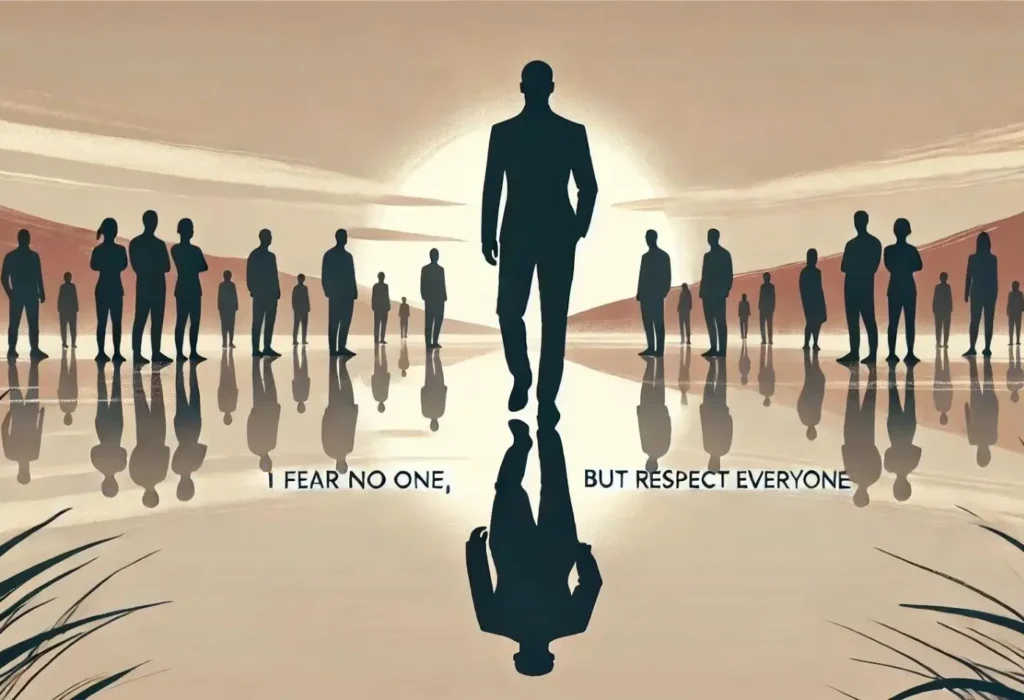
Discover the powerful message behind “I fear no one, but respect everyone – Tymoff” and how adopting this mindset can foster personal growth, confidence, and mutual respect.
Introduction
The phrase “I fear no one, but respect everyone – Tymoff” carries a profound and balanced philosophy of life. It encapsulates the perfect equilibrium between self-confidence and humility. In a world where fear can easily dominate our actions and interactions, embracing this mindset can lead to a life of dignity, personal empowerment, and healthy relationships.
Table of Contents
In this article, we’ll dive deep into the meaning of this powerful statement, its significance in both personal and professional spheres, and how you can apply it to your everyday life. We’ll also explore the difference between fear and respect, why each matters, and how Tymoff’s philosophy can reshape the way you perceive the world.
What Does “I Fear No One, but Respect Everyone – Tymoff” Mean?
The phrase is an assertion of strength and humility rolled into one. It speaks to having the courage to face any challenge or individual without fear while still maintaining respect for others, regardless of their status or views.
Breaking Down the Meaning:
- Fear No One: This is about inner strength and confidence. It’s not about arrogance or defiance, but rather an unshakeable belief in yourself and your ability to handle adversity. It encourages you to face life’s challenges without being intimidated by others.
- Respect Everyone: While you may have the strength to fear no one, this statement advocates that everyone deserves respect, no matter their background, beliefs, or position. Respect stems from recognizing the inherent value in others, even if you disagree with them.
Tymoff’s philosophy teaches us that true power lies not in dominating others but in staying true to ourselves while showing compassion and respect to those around us.

The Importance of Respect and How It Differs from Fear
In many instances, fear is mistaken for respect. However, these two concepts are vastly different.
Fear:
Fear often arises from a perceived threat, whether physical, emotional, or social. When you fear someone, it’s generally due to the belief that they have power over you, whether through authority, status, or potential harm. This can lead to negative feelings such as anxiety, submission, or resentment.
Respect:
Respect, on the other hand, is a positive emotion that stems from admiration for someone’s qualities, achievements, or even just their basic humanity. Respect does not require fear; rather, it comes from understanding, empathy, and recognition of mutual dignity.
To fear no one but respect everyone is to rise above the superficial power dynamics that often govern human interactions. It is to assert your independence from intimidation while still recognizing the humanity in everyone you encounter.
Why Embracing “I Fear No One, but Respect Everyone – Tymoff” is Important
1. Cultivates Inner Strength and Confidence
By declaring that you “fear no one,” you’re reinforcing a belief in your own resilience. This mindset helps you overcome insecurities, break free from fear-based decisions, and take on challenges with confidence. It’s a reminder that while others may have power, they do not control your sense of self-worth.
2. Promotes Humility and Empathy
Showing respect to everyone, regardless of their social standing or differences, keeps you grounded. It encourages empathy, which is essential in building meaningful relationships. By respecting everyone, you acknowledge that every individual has their own experiences and struggles, fostering a sense of compassion.
3. Improves Personal and Professional Relationships
Respect is the foundation of healthy relationships, both personal and professional. When you approach interactions without fear but with respect, you foster open communication, mutual understanding, and trust. In the workplace, this leads to better collaboration and a positive environment.
4. Encourages Personal Growth
Fear holds people back from reaching their full potential, whereas respect for others opens doors to learning and self-improvement. When you approach life with a fearless attitude but maintain a respect for others, you’re more likely to step outside your comfort zone, embrace challenges, and grow as a person.
How to Apply “I Fear No One, but Respect Everyone – Tymoff” in Your Life
Adopting this powerful philosophy requires conscious effort. Here’s how you can integrate it into your daily life:
1. Develop Self-Confidence
Start by believing in your own abilities. Practice self-affirmation, set personal goals, and celebrate your successes, no matter how small. Confidence doesn’t mean being perfect; it means being comfortable with who you are and what you can achieve.
2. Practice Empathy
Take the time to understand other people’s perspectives. Everyone has their own struggles, experiences, and views. By placing yourself in their shoes, you can offer them the respect they deserve, even if you don’t agree with them.
3. Let Go of Fear-Based Decisions
Recognize when fear is controlling your decisions. Are you holding back because of fear of failure, rejection, or judgment? By letting go of fear, you free yourself to pursue opportunities and face challenges without hesitation.
4. Respect Differences
In today’s diverse world, it’s important to show respect to people from all walks of life. Whether it’s differences in culture, beliefs, or opinions, respect allows for peaceful coexistence and collaboration.
FAQs on “I Fear No One, but Respect Everyone – Tymoff”
Q1: What is the main takeaway from “I fear no one, but respect everyone”?
The main message is about cultivating a balance between confidence and humility. It encourages you to have enough self-assurance to face anyone without fear, while also maintaining respect for every individual’s inherent worth.
Q2: How can this mindset help me in my career?
Adopting this mindset can significantly improve your professional life. Confidence without fear allows you to tackle challenges head-on, while respect for colleagues, supervisors, and clients fosters strong relationships, collaboration, and leadership.
Q3: Is it possible to respect someone you don’t like?
Yes. Respect doesn’t require liking someone; it’s about acknowledging their humanity and their right to their own opinions, regardless of whether you agree with them.
Q4: How can I overcome fear in social situations?
To overcome fear in social situations, focus on building self-confidence through positive self-talk, preparation, and small successes. Additionally, shifting your mindset to respect others rather than feeling inferior can help reduce social anxiety.
Q5: Can this philosophy improve mental health?
Yes. By letting go of fear and embracing respect, you reduce stress and anxiety, which are often driven by fear-based thoughts. Respect for others fosters healthier relationships, which can contribute to improved mental well-being.
Conclusion
The statement “I fear no one, but respect everyone – Tymoff” offers a powerful approach to life. It encourages self-confidence without arrogance and promotes respect without subservience. By embracing this philosophy, you can navigate personal and professional relationships with grace and strength, creating a more fulfilling and balanced life.
At its core, this mindset reminds us that while we should stand firm in the face of adversity, we must never lose sight of the dignity and value that everyone holds. Fear no one, respect everyone—it’s a way of living that promotes both personal empowerment and harmonious relationships with those around you.



